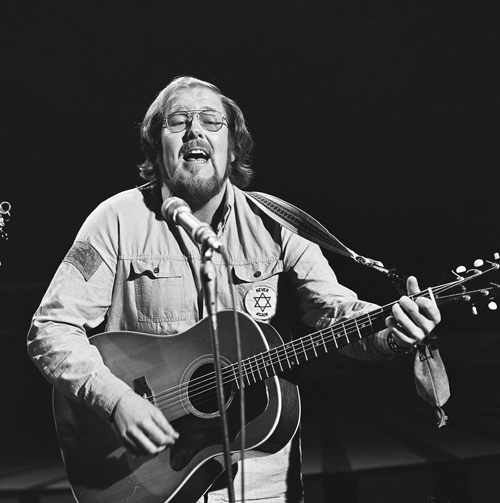
Soldier is a 1972 song, written and performed by British songwriter Harvey Andrews. Born in Birmingham in 1943, Andrews trained and worked as a teacher before becoming a full-time musician in the late 1960s. He remained active until 2012, recording 16 albums, though the 1970s was his most prolific period.
Andrews’ work was inspired was American folk music, from Woody Guthrie to Donovan. Like other folk musicians of the era, Andrews usually focused on ordinary people and their stories, often engaging in social commentary or political criticism. His thoughtful songs earned Andrews a loyal following and he toured widely, appearing at musical festivals in Britain and abroad. His songs did not receive much radio airplay, however, and only a handful made it onto singles charts.
Willetts, who was 27 years old and married, was the eighth British soldier killed in the Troubles and the first to die from a bombing. He was posthumously awarded the George Cross for his bravery.
Andrews’ lyrics depict the Troubles as a futile religious war (“another fight in Jesus’ name, the blind against the blind”). Called to service in Northern Ireland, British soldiers found themselves unwanted by Catholics, frustrated by sectarianism and at constant risk of death or injury. Those killed were “pawns lost in the game”. Soldier invoked considerable controversy when it was released in mid-1972. It was banned from broadcast on radio and the BBC, while British soldiers were ordered not to play or sing it.
Despite these bans, the song became enormously popular, both with Loyalists and British servicemen in Northern Ireland and elsewhere. Some condemned Soldier as pro-establishment and anti-Nationalist, a right-wing defence of Operation Banner. Andrews denied this, describing it as a song about human sacrifice that purposefully avoided taking political sides.
In the station in the city, a British soldier stood
Talking to the people there, if the people would
Some just stared in hatred and others turned in pain
And the lonely British soldier wished he was back home again.‘Come join the British Army!’ said the posters in his town
See the world and have your fun, come serve before the Crown
The jobs were hard to come by and he could not face the dole
So he took his country’s shilling and enlisted on the roll.For there was no fear of fighting, the Empire long was lost
Just ten years in the army getting paid for being bossed
Then leave a man experienced, a man who’s made the grade
A medal and a pension, some memories and a trade.Then came the call to Ireland as the call had come before
Another bloody chapter in an endless civil war
The priests they stood on both sides, the priests they stood behind
Another fight in Jesus’ name, the blind against the blind.The soldier stood between them, between the whistling stones
And then the broken bottles that led to broken bones
The petrol bombs that burned his hands, the nails that pierced his skin
And wished that he had stayed at home surrounded by his kin.The station filled with people, the soldier soon was bored
But better in the station than where the people warred
The room filled up with mothers, with daughters and with sons
Who stared with itchy fingers at the soldier and his guns.A yell of fear, a screech of brakes, a shattering of glass
The window of the station broke to let the package pass
A scream came from the mothers as they ran towards the door
Dragging children crying from the bomb upon the floor.The soldier stood and could not move, his gun he could not use
He knew the bomb had seconds and not minutes on the fuse
He could not run to pick it up and throw it in the street
There were far too many people there, too many running feet.“Take cover!” yelled the soldier, take cover for your lives
And the Irishmen threw down their young and stood before their wives
They turned towards the soldier their eyes alive with fear
For God’s sake save our children or they’ll end their short lives here.The soldier moved towards the bomb, his stomach like a stone
Why was this his battle? God, why was he alone
He lay down on the package and he murmured one farewell
To those at home in England to those he loved so well.He saw the sights of summer, felt the wind upon his brow
The young girls in the city parks, how precious were they now
The soaring of the swallow, the beauty of the swan
The music of the turning earth, so soon would it be gone.A muffled soft explosion and the room began to quake
The soldier blown across the floor, his blood a crimson lake
They never heard him cry or shout, they never heard him moan
And they turned their children’s faces from the blood and from the bones.The crowd outside soon gathered and the ambulances came
To carry off the body of a pawn lost in the game
And the crowd they clapped and jeered and they sang their rebel songs
One soldier less to interfere where he did not belong.But will the children growing up learn at their mothers’ knee
The story of the soldier who bought their liberty
Who used his youthful body as a means towards an end
Who gave his life to those who called him murderer, not friend.
© Alpha History 2018. With the exception of music and lyrics, content on this page may not be republished or distributed without permission. For more information please refer to our Terms of Use.
This page was written by Jennifer Llewellyn and Steve Thompson. To reference this page, use the following citation:
J. Llewellyn and S. Thompson, “Soldier (Harvey Andrews, 1972)”, Alpha History, accessed [today’s date], https://alphahistory.com/northernireland/soldier-harvey-andrews-1972/.
